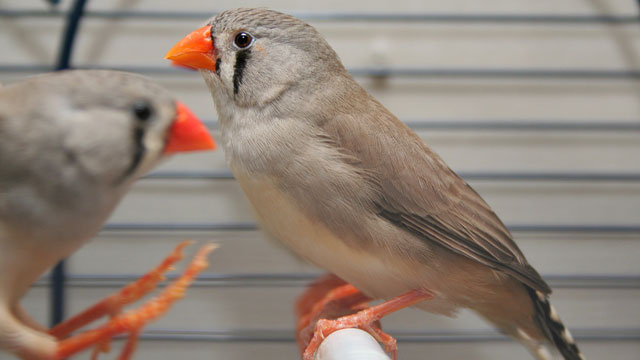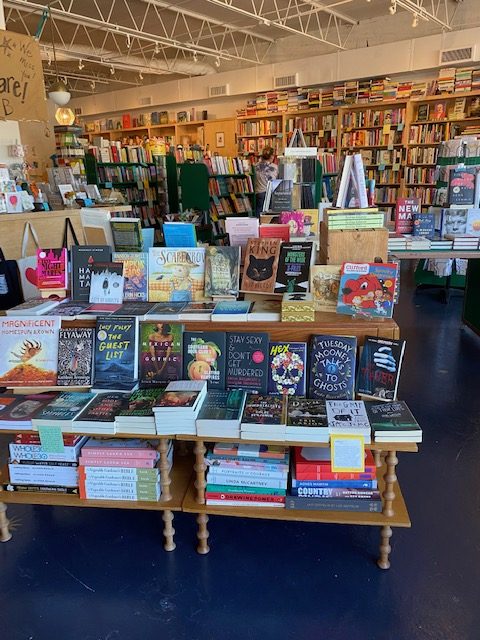MUTE FEMALE FINCHES: a satire by Stephen Ira

Dramatis Personae:
LOU SULLIVAN was a
gay trans activist
who passed away
in 1991
ANDREW SULLIVAN is an
English-born American author
editor and blogger
DAVID TOMLINSON was
best known as Mr. Banks
in Mary Poppins (1961)
Special Thanks:
George Michael
(Lights up on LOU SULLIVAN, alone, impassioned.)
LOU SULLIVAN:
I feel so unsure!
As I take your hand, and lead you to the dance floor.
(The smoke of dry ice is general.)
LOU SULLIVAN:
As the music dies! Something in your eyes!
calls to mind a silver screen
and all
its sad
goodbyes!
(Some smoke, stage left, clears, revealing ANDREW SULLIVAN, who is sitting down.)
ANDREW SULLIVAN:
It is possible to tell who has won a tennis contest not by watching the game, but by monitoring testosterone-filled saliva samples throughout.
LOU SULLIVAN:
So I’m never gonna dance again!
Guilty feet have got no rhythm!
Though it’s easy to pretend,
I know you’re not a fool!
ANDREW SULLIVAN:
I have always tended to bury or redirect my rage. I once thought this an inescapable part of my personality. It turns out I was wrong.
(LOU SULLIVAN is becoming visibly upset at these interruptions.)
ANDREW SULLIVAN: Other scientists theorizing that it was—
(LOU SULLIVAN retrieves a large net from a bag)
ANDREW SULLIVAN: —testosterone that enabled the male zebra finches to sing—
(LOU SULLIVAN creeping up on him)
ANDREW SULLIVAN: —injected mute female finches with testosterone—
(LOU SULLIVAN catches ANDREW SULLIVAN first try)
ANDREW SULLIVAN:
(Frustrated, from within the bag, but not to be silenced:)
Sure enough,
the females sang.
A Bookseller’s Reading Snapshot

I like to hear about people’s reading habits—not just what they’re reading, but how. In the middle of the night, first thing in the morning, on the train, on the toilet, three books at a time, strictly poetry, in a deep musician biography phase—whatever. I like to hear when people are struggling to read—maybe because they can’t find the time or can’t find a book that holds them, maybe because they’re in the throes of grief or just having too good a time. It occurs to me every once in a while that some people just don’t care about books the way I just don’t care about, say, golf. Part of my job, if I’m being completely honest, is to make books look good, and make the reading life look good. I need people to buy in to the idea that owning stacks of books is important, that books are worth spending money on, especially since it’s entirely possible to own zero books and read as many as you want for free. I love this challenge. I hate capitalism but I love selling books, talking about books, and trying to learn as much as I can about why and how people read.
The place, generally speaking, where I feel most “free” to read, is in bed, before sleeping, after I’ve written in my five-year journal. I started my Tamara Shopsin journal three years ago and I cannot sleep until I’ve written something down—it’s a mental logging off for me, downloading my day somewhere safe and physical, which frees me to read without Bowsers from the day sneak-attacking my brain, enticing me to regret what I said to so-and-so or how I handled xyz parenting situation. Not now, Bowser! I’m reading. I also work hard to clear swaths of daytime hours on the weekend at least a couple of times a month, actually schedule this as I would a doctor’s appointment. Otherwise it won’t happen. The rest of my reading happens catch-as-catch can, while I’m waiting for other things, when I have a surprise thirty minutes, etc.
I read a lot because that’s my job, and it’s my job, in many ways, because I read a lot. The reading a lot part came first, and led me down a very winding path to where I am now. Here’s what I’ve been reading:
READ MORE >Classic Memorable Lines
Note from Sebastian:
I first became aware of Mark through HTMLGiant. He seemed wild and purified from the disgusting world. I sent Mark an email, never speaking directly with him beforehand, saying that I would like to write a book with him some day. He said yes. A few years passed, and then one day I received an email from Mark saying that he was ready to start writing this book together. We discussed a few ideas. One (via Mark) was to write a book called What Should Our Book Be About?. We would discuss ideas for what our book should be about until that itself filled the length of a book. I liked this because it meant that the book had already started, without our knowing it. We then had the idea that we would write a book composed solely of the kind of “classic, memorable lines” one finds in famous novels. People get tattoos of these lines on places like their neck or bicep. Mark said that critics would say “This book is full of classic, memorable lines.”
We sent emails back and forth for a few months during the summer and early fall of 2016. The project was never completed as Mark was tragically killed by a driver as he was walking across the United States for the second time—this time barefoot. He was raising money for a collective dedicated to addressing climate change. A movie about Mark’s life titled Barefoot: The Mark Baumer Story will be released digitally on October 27th, via Deadline. Though I only had the privilege of knowing Mark briefly, I thought he was a beautiful person, unlike anyone I’d ever met before, or will likely ever meet.
***
CLASSIC MEMORABLE LINES
by Mark Baumer & Sebastian Castillo
A group of teenagers were complaining about the air quality in their lives while a parental guardian looked on and dropped spoonfuls of raisin yogurt in a bottle of ice tea which was later spilled on a rented laptop.
One day, Jonathan printed out every email he had ever received in his life on industrial cardboard and built a large boat with the collection of them, sailing around the world six or seven times—the long trail of Hewlett-Packard printer ink fatally poisoning a small percentage of the planet’s aquatic animals, though Jonathan only realized this years later, when he was eating a fillet of fried cod at his favorite local restaurant, and found the fragment of a note he had once emailed to himself, reminding him to send an apology to a friend whom he had engaged in petty argument, a task Jonathan never completed, damaging their friendship in a vague manner neither could articulate any longer.
As I was falling asleep in a meeting this afternoon, a project manager named Stu said, “I need a bowl,” and walked out while Kathy was describing how to delete orphans from a lost database she found in the utility closet behind the box of sweaters and unclaimed post-its.
Because I narrate everything I do—Nick eats cereal, Nick turns off the computer, Nick kneels—I wonder how many verbs I have left in my life, and what I would change if I knew the total number, if anything.
A person with a large bag of groceries began walking across town as they slowly emptied the bag by placing food items in various mailboxes and other containers.
No music itself has ever had a standard duration of time because if one were to play the music slowly, it would last longer—maybe even for centuries, if a player were talented enough to do so and live through the slowness of their own actions, which can be difficult to understand.
The five potted ferns on the floor of this one particular woman’s bedroom did not seem to grow during the first eight years they inhabited the space together which sometimes upset the woman though she also realized she herself was no longer growing so she tried not to get too upset at objects that basically were unable to openly react to her emotions, but as it turns out one afternoon during a very bad financial meltdown the ferns seemed to change their minds about growth and began investing in the development of themselves which I guess would have been something of a happy ending if the woman had somehow been able to mimic her ferns’ new life decision.
The church was on a hill, which was on a white, flat plain, which was on a burial ground that stretched from one end of the known universe to the next, and even beyond that, though this was seldom mentioned by parishioners entering the church’s wet doorway, looking for a floating mouth to say cold, enchanting things.
A few hours before the movers showed up to empty out my uncle’s condo, a deer with one blue eye and one yellow eye lay down in the driveway and died.
I looked outside my window (I was told I had to do this), and noticed that it was a different season.
Our company was having a holiday party, but the DVDs of the pasta bar didn’t arrive in time so everyone sat on the floor of the banquet hall and drew noodles on their own palms with permanent markers.
Ron walked to the office’s water cooler and said, “Words in translation are often insulting like what language is this even,” and walked away from the water cooler.
For the majority of second grade Heather moaned just soft enough that no one ever asked her to stop or if she was in pain.
For the invisible village who live within Nestor’s Super Mario Bros. 3 cartridge, the ritual of blowing a healthy wind into the frame required to make the technology work is closer to annihilation than renewal—but even then they chant, “No hope, no fear, no castles, no green tubes through which we can escape.”
A musical instrument burning at the bottom of a moist, anxious canyon thought, “I don’t know how to have creative emotions anymore.”
Mark’s favorite operating systems, in order, where: cabbages, Windows ’95, anchorite dietary practices, tenor saxophone, and anti-Linnaean taxonomies.
This one is a little bit erotic because I’m technically almost a baby vulture and my husband is too busy water-logging oracles with his leftover speedboat meat to write thank you notes to everyone who showed up at our basement party so I guess it’s up to me to address all those dear metro horses.
Hell is boring and filled with 2,000 swimming pools for the bats to cool themselves in before their daily chores; no one else is allowed to use the pools except for successful lawyers, and only on Sundays.
When I got to work, one of my coworkers said, “Hey, I got a new tongue,” but when I looked closely at this coworker I realized it was a chair.
An entire orchestra was stationed in the bed next to me at the hospital: the violin players were bleeding; the cellists and trumpetists coughing, sagging over their own bodies; the drummers had holes in their heads the size of overripe grapefruit—and still, they managed to play a feeble tune, something that reminded me of songs I’d heard back in kindergarten, and I told them so, that it felt like my soggy memory was arriving to this cold, antiseptic place, though they didn’t hear me over their moribund din, the conductor’s baton striking instruments both medical and musical.
The personality test asked me to list all one-hundred possible uses for a brick, but I only came up with thirty-two: shoe, balloon, helmet, deodorant, fish, wall, toothbrush, phone, car windshield ice scrapper, ski pole, tennis racquet, celebration tool for when they’re playing your song, baseball, toilet brush, hair dryer, comb, halloween mask, bean masher, ice cube, door knob, pillow, ear plug, camera, bookmark, bikini fastener, underwear filler, snowman melter, washcloth, wire toucher, dj equipment, email, karaoke microphone.
Delillo is Dad
On the morning of 9/11 I ate buttered toast at the kitchen bar of my dad’s house while we all watched the smoking tower on network news. I asked my dad what was happening and he frowned and shrugged and said he didn’t know. On the drive to school we listened to country music, and at school some of my teachers had wheeled out TVs for us to watch and they said things like “oh my god” and that the world would never be the same.
I’ve noticed people like to use the word ‘corny’ now, when talking about writing that’s straightforward or sincere, that lacks a kind of technical obscurity or contains information that might be useful to people who didn’t grow up with stuffed bookshelves in a study. Writing that feels fitted to the time we live in, in which events, if they are to be remembered as events at all, need to swell like orchestral music in time with some grander narrative that everyone can see. A story gets slotted into memory tissue that way, at the expense of skepticism for the books that generate collective feeling, or that try giving a name to the panic and dread beneath the products and vacations and posts.
Don Delillo was the first adult that ever spoke to me about what television was really doing, and why I had these scattered image-thoughts, and what really happened to our nuclear waste, and the perfectly American violence of organized sports, and the danger of where it was all headed. My own dad dropped us off at school that Tuesday and went back to work in the woods with his dad, my grandfather, who once drove a massive wooden peanut on a flatbed truck to Jimmy Carter’s White House to protest the designation of old growth redwood forest as protected land, out of reach of local loggers like them.
A lot of people in America still think the American Dream is something real and attainable, that they won’t have to trade their sanity or literal life to get close to it. They don’t wonder about nuclear fallout or how screens, clearly and inarguably, are making us all insane. They love to watch football, except for the national anthem part (now). They think we were justified in invading Iraq. They have kids, and this is what they teach their kids, and if the kids are lucky then one day they find Don Delillo, who tells them something else.
I get the urge to tear down the massive Macy’s Day Parade balloon of Don Delillo, shadowing as he does for writers of novels and stories the whole landscape of post-war America because he wrote about the psychotic malaise of NYC creative directors way back in 1971. I get that White Noise only really hits before you turn 23, and I agree that you can’t say he’s your favorite living novelist, even though he is mine. But why do we dunk, really?
Maybe we dunk not what we fail to understand, but what we understand too easily. I don’t think it’s corny to point out a hot plate to a child, to mouth the word hot, and to suggest we don’t touch. I’m okay with Delillo making millions off of this, and receiving awards for it, and I’ll happily exchange his lack of intimacy for some thoughtful takes on what the fuck is going on, delivered by a person who insists, strictly, on using a landline. I’m grateful to him for delivering his lectures from a distance, which is what a dad should do. And personally, I look forward to reading whatever vision he has for the day our screens collectively and finally go out.
Pretend Interview with Nicolette Polek
This past January, I accompanied Nicolette Polek to California for events related to the release of her first book, Imaginary Museums, out now from Soft Skull Press. On our drive from Berkeley to Los Angeles, we listened to Matthew Zapruder’s Otherppl interview, in part because we’d read with Matthew the night before, and in part because Nicolette was going to go on Otherppl when we were in LA. When we stopped listening, Nicolette asked me if I could pretend to interview her, so she could get used to answering questions, which she would also have to do at her event with Kathryn Scanlan the next day. I secretly recorded the pretend interview. What follows is an edited selection of her answers during our “interview.”
I feel like what people refer to as surreal is what I maybe just view as surprising… or, strange juxtaposition… a smiling person… or… for example…
See? That was a good pause.
It was the start of something…
READ MORE >Guided Meditation 1: Sponge

*Read gently, with contemplative pauses between each paragraph*
Hello. My name is Dan, and I’ll be guiding your meditation today.
Now, I don’t usually do this, but Charlene, your usual guide, was feeling a bit anxious today, and that wouldn’t have been good for any of us.
Anyway, how are y’all doing?
Good, good, good.
What say we get started?
